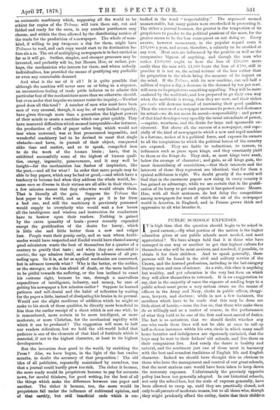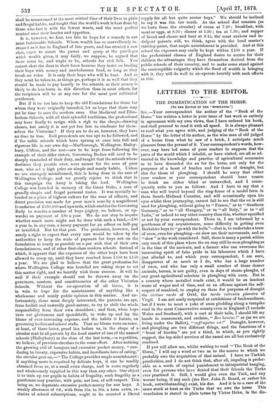PUBLIC SCHOOLS' EXPENSES.
IT is high time that the question should begin to be asked in good earnest,—By what portion of the nation is the higher education given at our public schools most needed, aud most appreciated ? We have always held that it is those who have managed in one way or another to get that highest culture for themselves who will be moat anxious, and resolved, if possible, to obtain it for their children. And to speak generally, these persons will be found in the civil and military service of the Crown, and the learned professions, including in the last category literary men and men of science. As a rule, this class is anything but wealthy, and yet education is the very last item on which they will allow themselves to retrench. It is no exaggeration to say, that in the majority of cases the expense of sending boys to a public school must prove a very serious strain on the means of officers in the Army and Navy, clerks in public offices, clergy- men, lawyers, and doctors ; while in not a few instances, the sacrifices which have to be made that this may be done are little short of heroic,—none the less so, that those who make them do so willingly and as a matter of course, in the performance of what they hold to be one of the first and most sacred of duties. The fact is so notorious, that we should doubt whether any one who reads these lines will not be able at once to call up half-a-dozen instances within his own circle in which many small home luxuries and indulgences are rigorously curtailed, that the boys may be sent to their fathers' old schools, and live there as their companions live. And surely the desire is healthy and natural, and the sentiment just one of those most in harmony with the best and soundest traditions of English life and English character. Indeed we should have thought this so obvious to those who have the management and control of our great schools, that the most anxious care would have been taken to keep down the necessary expenses. Unfortunately the precisely opposite policy has been too generally adopted. In our historical schools, not only the school fees, but the scale of expense generally, have been allowed to creep up, until they are practically closed, not only to all parents of moderate means, but to all those who, though they might prudently afford the outlay, desire that their children
shall be accustomed at the most critical time of their lives to plain and frugal habits, and taught that the world's work is hest done by those who face it with the fewest wants, and the most perfect control over their fancies and appetites.
It is, however, we fear, too late to hope for a remedy in our most fashionable Schools. Where wealth has so marvellously in- creased as it has in England of late years, and has created a new class, eager to assert the power and grasp at the privileges which wealth gives, it may fairly, we suppose, be argued that there must be, and ought to be, schools for rich folk. You cannot shut the door in their faces because they insist on loading their boys with money and unwholesome food, so long as they break no rules. It is only their boys who will be hurt. And as they must be taken in, as things go, perhaps it is as well that they should be made to pay heavily to the schools, as their money is likely to do less harm in this direction than in most others, for the recipients will be at any rate for the most part cultivated gentlemen.
But if it be too late to keep the old Foundations for those for whom they were originally intended, let us hope that there may yet be time to save the modern ones. Our Mediieval and Eliza- bethan Schools, with all their splendid traditions, the professional may have finally to resign with a sigh to the cheque-drawing classes, but surely it is not yet too late to vindicate for them- selves the Victorian ? If they are to do so, however, they have no time to lose. Evil precedents are too apt to be followed, and if the noble schools which have sprung at once into full and vigorous life in our own day—Marlborough, Wellington, Hailey- bury, Clifton, and the rest—are to be kept from following the example of their elder sisters, Governing Bodies will need to be sharply reminded of their duty, and taught that the schools whose destinies they preside over, were meant for the sons of poor men, who set a high price on simple and manly habits. Unless we are strangely misinformed, this is being done in the case of Wellington College, and we greatly rejoice to think that in this campaign the Army is taking the lead. Wellington College was founded in memory of the Great Duke, a man of grandly simple and frugal personal tastes. It was specially in- tended as a place of highest culture for the sons of officers, and direct provision was made for poor men's sons by a magnificent foundation of £150,000 and upwards, which enables the Governing Body to receive a number of boys (eighty, we believe, or up- wards) on payment of £80 a year. We do not stop to inquire whether much more might not be done with such a fund,-180 a year is, in any case, a heavy payment for an officer on half-pay or invalided. But let that pass. The profession, however, had surely a right to expect that every care would be taken by the authorities to keep the scale of payment for boys not on the foundation as nearly as possible on a par with that of their own foundationers, and of other first-class modern schools. Instead of which, it appears that the expenses of the other boys have been allowed to creep up, until they have reached from £130 to £150 a year. We are glad to believe that the great profession for whom Wellington College was founded are taking steps to set this matter right, and we heartily wish them success. It will be well if their example should not be thrown away on the governors, masters, and constituencies of the other Victorian Schools. Without the co-operation of all three, it is in vain to hope for the maintenance of anything like a wholesome and manly public opinion in this matter. And un- fortunately, those most deeply interested, the parents, are apt, from foolish and cowardly good-nature, to try to shift the whole responsibility from their own shoulders ; and then, when boys turn out gluttonous and spendthrift, to wake up and lay the blame of ever-increasing expense, and the habits it fosters, on governing bodies and school staffs. That no blame rests on some, at least, of these latter, proof lies before us, in the shape of a circular sent to all parents by the head master of one of the named schools (Haileybury) at the close of the last term,—a repetition, we believe, of previous circulars to the same effect. After noticing the growing evil of hampers and excessive pocket-money, " con- ducing to luxury, expensive habits, and inordinate love of eating," the circular goes on,—" The College provides ample nourishment ; if anything more is required by delicate boys, it can be readily obtained from us, at a small extra charge, and is more regularly and wholesomely supplied in this way than any other. Our object is to train up our pupils in habits of frugality, such frugality as a gentleman may practice, with gain, not loss, of self-respect. This being so, we deprecate excessive pocket-money for our boys. A weekly allowance of 6d., with from 25s. to 30s. a term extra, ex- clusive of school subscriptions, ought to be counted a liberal
supply for all but quite senior boys." We should be inclined to say it was 10s. too much. As the school diet consists (as we learn from the circular) of cocoa at 7.20 ; breakfast, with meat or eggs, at 8.30 ; dinner at 1.30 ; tea at 7.30 ; and supper of bread and cheese and beer at 8 45, the most anxious and in- dulgent parents will, we think, agree with the head master's starting-point, that ample nourishment is provided. And at this school the expenses may easily be kept within £100 a year. If the professional classes of England desire to secure for their children the advantages they have themselves derived from the public schools of their country, and to make some stand against the contemptible vulgarity which the flood of wealth is bringing with it, they will do well to co-operate heartily with such efforts as this.



































 Previous page
Previous page